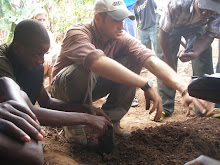Last year one of the most successful projects I took part in was the five day environmental mini-camp for teenagers living around Nyika National Park (see my blog from Nov 2008). Which is why I decided to organize another camp this year. The idea of the camp is to provide young people living around Nyika plateau with skills that they can use to improve their communities livelihood without poaching or otherwise destroying the parks resources. We also want to impart an appreciation for Nyika's uniqueness, and value to the environmental health of the entire Northern Region,.
This year we will teach the students about business skills, soap making, beekeeping, fish farming, and Jam making. There will be a focus on sustainable agriculture since farming makes up about 98% of rural Malawians livelihood. We will take a field trip to visit a Permactulture farm in Livingstonia, and also visit another Malawian lead farmer who is practicing a variety of sustainable techniques. We'll also teach practical sessions in compost making, contour line ridging and tree nursery propagation. But as I said the main idea of the camp is to impart a greater respect for the park itself, so we will have a lecture from a Malawian bird expert, and he will lead the entire group on a bird walk. We will also hike to Manchawe falls, and will be discussing Nyika's value as the Northern region's primary watershed the entire week.
Nyika is so unique in Africa, because most of it's 3,000 sq km are a grassy plateau that rises over 1800m. It supports a wide variety of birds and wildflowers that aren't found anywhere else in Malawi. More than 200 species of orchid have been recorded in the park, and 27 of them are endemic to Nyika alone. Sadly many people living around the park see orchids value only as a food delicacy. One of my friends working as a game scout, recently told me about catching a villager who had already dug up 9 buckets full of orchid bulbs that she was intending to sell in Chitipa where she can get as much as MK6,000 (about $40) for 1 bucket. This shows the lack of understanding people living around the park have for the uniqueness of this very special place. Which is exactly the issue that our camp is trying to address.
This is also a great opportunity for those of you who are interested to support one of my projects. I wrote the grant to fund the camp through Peace Corps Partners Program, which takes tax deductible contributions from friends and family of Peace Corps volunteers to put directly into our projects. All you have to do to donate is go to www.peacecorps.gov/contribute and search for either my name or enter the project number 614212 and make your contribution. I appreciate any support anybody can offer.

No comments:
Post a Comment